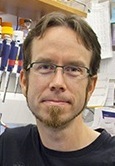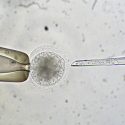Two UW-Madison researchers named Shaw Scientists
Two University of Wisconsin–Madison professors will receive 2012 Shaw Scientist Awards, the Greater Milwaukee Foundation announced today (Wednesday, May 30).

Mehle
Chosen by a panel of prominent scientists from around the country, $200,000 Shaw prizes will be awarded to Andrew Mehle, assistant professor of medical microbiology and immunology, and David Pagliarini, assistant professor of biochemistry.
Mehle studies the way influenza viruses interact with human cells — especially why avian influenza viruses do not normally replicate or spread efficiently in humans. His research into ways the virus may more successfully spread could open the door to new antiviral therapies and better prediction and prevention in the event of influenza outbreaks.

Pagliarini
Pagliarini’s research explores the function of mitochondria, which are a hub of cellular metabolism and energy production. Malfunctioning mitochondria can lead diseases such as Alzheimer’s, Parkinson’s, type II diabetes and several kinds of cancer. A better understanding of how mitochondria work could help treat or fend off those disorders.
Xiaohua Peng, an assistant professor in University of Wisconsin-Milwaukee’s department of chemistry and biochemistry, also won a Shaw award.
Shaw Scientists were first named in 1982 thanks to a $4.3 million bequest from Dorothy Shaw, widow of James Shaw, a prominent Milwaukee attorney. In addition to $2 million in special grants, the fund has given out more than $11 million to 60 scientists.
The annual awards provide needed support to young scientists engaged in groundbreaking research in the fields of genetics, cell biology and cancer research at critical stages in their careers.
“It has become increasingly challenging for scientists to obtain extramural funding for their research, and this is especially true for young faculty,” says Paula Traktman, chair of the Shaw Scientist Advisory Panel and Walter Schroeder professor and chair of the Department of Microbiology and Molecular Genetics at the Medical College of Wisconsin. “The funding provided through the Shaw Scientist program is unrestricted and flexible, which allows these exceptional scientists to build research programs, establish track records, and pursue high risk/high impact projects.”


